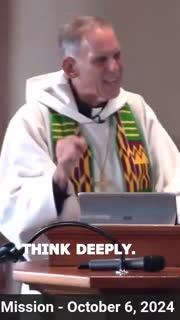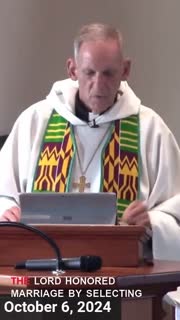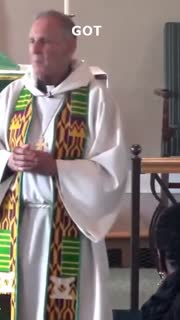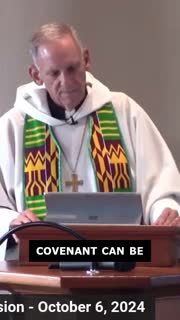Strengthening Marriages Through Biblical Principles and Reconciliation
Devotional
Sermon Summary
Bible Study Guide
Sermon Clips
1. "God expects us to think deeply. God expects us to pray passionately. God expects us to listen closely to the Holy Spirit and to act accordingly. Not to have everything laid out in black and white. So, like the Pharisees, we can stay within these particular boundaries. That's not what God did. So the question what constitutes leaving and cleaving? The clause seems to imply a physical, emotional and spiritual bond. And that's the way it's been understood. The emotional, spiritual and physical bond that a person has with their parents. Is replaced with the emotional, spiritual and physical bond. That's formed with a spouse." [46:33] (51 seconds)
2. "The Lord honored marriage by selecting it as a metaphor for his relationship with his church. We are his bride, loved and nurtured. And grace is the powerful ingredient that will bind a man and a woman together when their imperfection pulls them apart. If at all possible, it's better to be reconciled and allow God to heal and to restore. He's pretty good at that. I've seen resurrection in marriage after. The person becomes genuinely convicted by their sin, and they only saw divorces and option. I've seen God move powerfully in many, many relationships." [49:21] (51 seconds)
3. "When I got married, Lisa and I made a promise that we would not get a divorce, and we meant it. And we've had hard times. There were times where I know I've not been easy to live with. There are times where we didn't see eye to eye. But here's the thing. If you marry someone and you say it's forever, who wants to be miserable, right? You're going to work at it. You're going to compromise. You're going to seek a way to find that joy and that peace in your relationship. And quite frankly, if you're not doing that, that's cruelty. You need to find ways of leaving and cleaving." [53:56] (46 seconds)
4. "The marriage covenant can be broken. It can be broken by sexual infidelity, the one flesh rule. And it can be broken by leaving and cleaving, by not bonding with your spouse. But God desires forgiveness, and God's heart is always reconciliation and restoration. And I'll tell you one of the things, when my sister married her first husband, she's been married multiple times. But I remember talking to her first husband, and right before they tied the knot, so to speak, and I said, well, what are you going to do if it gets tough in marriage? Because I knew this guy, he had been a friend of mine, I knew he wasn't really a stick to it kind of guy. I said, what are you going to do when things get tough? He said, well, we're just going to try this. If it doesn't work out, we'll get a divorce." [52:45] (56 seconds)
Ask a question about this sermon
2. "The Lord honored marriage by selecting it as a metaphor for his relationship with his church. We are his bride, loved and nurtured. And grace is the powerful ingredient that will bind a man and a woman together when their imperfection pulls them apart. If at all possible, it's better to be reconciled and allow God to heal and to restore. He's pretty good at that. I've seen resurrection in marriage after. The person becomes genuinely convicted by their sin, and they only saw divorces and option. I've seen God move powerfully in many, many relationships." [49:21] (51 seconds)
3. "When I got married, Lisa and I made a promise that we would not get a divorce, and we meant it. And we've had hard times. There were times where I know I've not been easy to live with. There are times where we didn't see eye to eye. But here's the thing. If you marry someone and you say it's forever, who wants to be miserable, right? You're going to work at it. You're going to compromise. You're going to seek a way to find that joy and that peace in your relationship. And quite frankly, if you're not doing that, that's cruelty. You need to find ways of leaving and cleaving." [53:56] (46 seconds)
4. "The marriage covenant can be broken. It can be broken by sexual infidelity, the one flesh rule. And it can be broken by leaving and cleaving, by not bonding with your spouse. But God desires forgiveness, and God's heart is always reconciliation and restoration. And I'll tell you one of the things, when my sister married her first husband, she's been married multiple times. But I remember talking to her first husband, and right before they tied the knot, so to speak, and I said, well, what are you going to do if it gets tough in marriage? Because I knew this guy, he had been a friend of mine, I knew he wasn't really a stick to it kind of guy. I said, what are you going to do when things get tough? He said, well, we're just going to try this. If it doesn't work out, we'll get a divorce." [52:45] (56 seconds)




